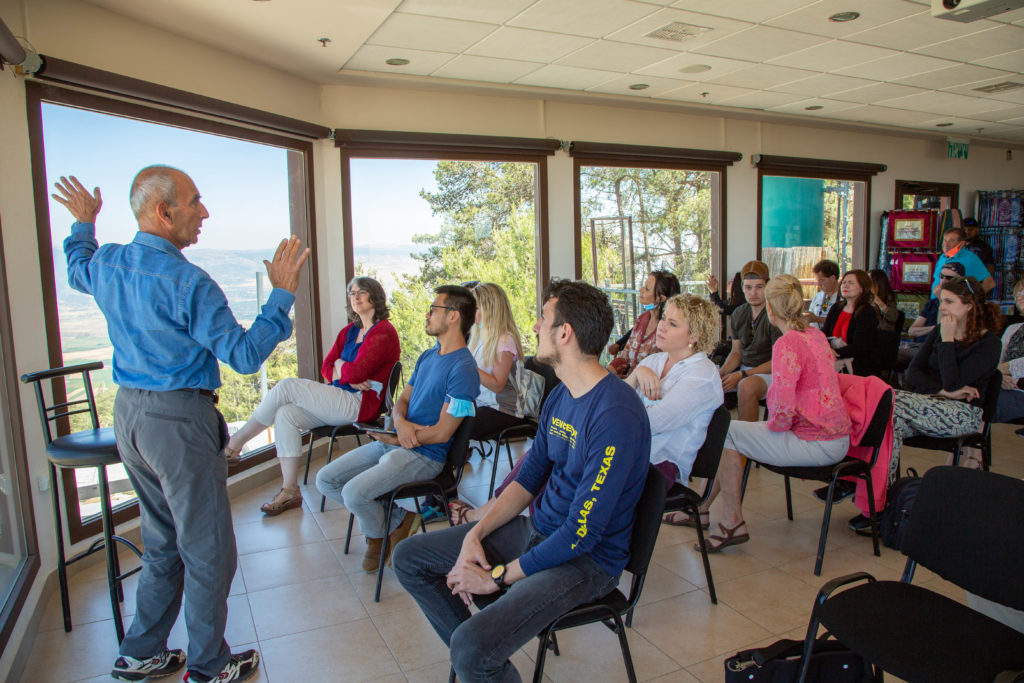
A Day with the Druze
Published on: 1.12.2020By: Laurina Driesse
With an early start to a sunshine-filled day, there was much excitement as the ICEJ staff set out from Jerusalem one morning in early June to visit the Druze community of Hurfeish, just four kilometers from Israel’s northern border with Lebanon.
A close-knit, Arabic-speaking minority, the Israeli Druze live mostly in small towns nestled in the Carmel range, Upper Galilee and Golan Heights. While their unique cultural and religious practices differentiate them from other Israeli Arabs, they especially stand out due to their steadfast loyalty as Israeli citizens who serve honourably and with pride in the Israel Defense Force (IDF).
Besides the residents of Hurfeish, some 250,000 other Israelis live within nine kilometers of the Lebanese border in a hilly, pastoral area that belies underlying tensions. Stick around for a while, though, and one is likely to experience a disruption of that deceptive tranquility – a fact underlined by the recent IDF discovery of six underground tunnels which Hizbullah terrorists intended to use to infiltrate Israeli border communities.
Unfortunately, a severe shortage of adequate bomb shelters along the border means that communities there are ill-prepared for Hizbullah rocket attacks. This is a reality that authorities are working to correct and the ICEJ, due to the generosity of our German supporters, will soon deliver two portable shelters to the Hurfeish Cultural Center – a focus of Druze youth activity and community life.
However, those living in the northern periphery far from the economic center of the country face other challenges as well. High rates of unemployment or under-employment as well as a lack of urban development create barriers to economic growth for both individuals and communities. Investment in education is essential to improve opportunities for women and young people.
To address these needs, the ICEJ is enriching Druze schools in partnership with local leaders by providing such things as computer labs, upgrading libraries, or adding a music room. Our most recent project includes sponsoring an Aviators Program that works in conjunction with the Israeli Air Force and the Ilan Ramon Centre. Currently two Druze schools participate in this program, which aims to develop positive social and ethical leadership among youth, setting a foundation for responsible citizenship.
Mentors encourage young people to dream big, then motivate them to achieve success by accomplishing small goals one step at a time. One highlight of the program is interaction with Israeli air force pilots, who act as role-models and meet monthly with the youth to inspire them towards excellence at school and in all they do.
A local English teacher confided that she wished her own children were able to be in this program. “We’ve seen such amazing change and progress in the children participating that we couldn’t believe it”, she said. “We’re hoping to expand to all schools in the Druze sector.”

The ICEJ staff outing then took us to Misgav Am, which provides a high vantage point for looking over the border into southern Lebanon. Afterwards, we tasted warm Druze hospitality while harvesting ripe-red cherries at an orchard in the Golan, followed by a satisfying Mediterranean-style dinner in Kfar Buq’ata, a Druze village near the foot of Mt. Hermon. Before travelling back to Jerusalem, our host, Mofid Aamer, shared about his 28 years of service in the IDF Special Units and his passion for education to help the next generation achieve a better future. We share his passion to strengthen Israel and know that lifting up all her people is key to realizing it.
Your generous giving enables us to provide a future and a hope to the next generation in Israel.